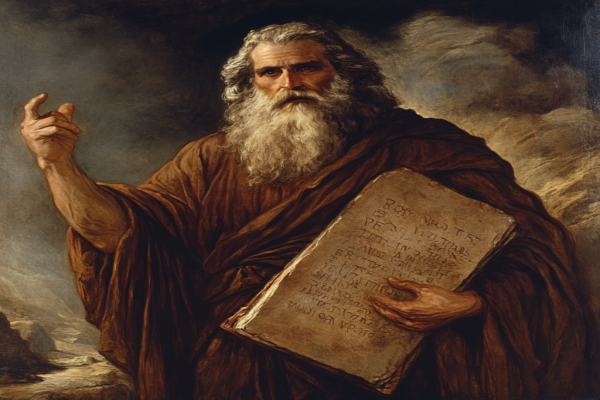Question
Gramps,
What was the law before the 10 commandments were given?
Vitor
Answer
Vitor,
Before Moses received the Ten Commandments on Mount Sinai, various moral and divine laws governed the behavior of humanity. These laws, stemming from divine revelation and social development, provide a crucial context for understanding the evolution of moral law. This article explores the moral codes established from the time of Adam and Abraham, the implications of the Law of Moses, and the influence of ancient Near Eastern legal traditions, ultimately illustrating the theological significance of these pre-Mosaic laws.
The earliest known moral codes can be traced back to Adam and Abraham. The covenant made with Adam emphasized principles of righteousness, obedience, and the law of sacrifice. As detailed in the Book of Mormon, these foundational moral codes were taught to subsequent generations, establishing a legacy of divine expectations. Abraham received the priesthood and was given commandments that included faithfulness and charity, as seen in Abraham 1:1-4.
These early commandments demonstrate that God’s desire for righteousness among His people was not limited to the later revelations given to Moses. Instead, they reflect a continuum of divine instruction aimed at guiding humanity toward ethical living and spiritual integrity. Adam and Abraham’s experiences illustrate how God communicated His will to His chosen servants, setting a precedent for the moral standards that would later be codified in the Ten Commandments.
The Law of Moses, which encompasses the Ten Commandments, is a comprehensive legal framework designed to guide the Israelites in their covenant relationship with God. While the Ten Commandments serve as a summary of these laws, the entirety of the Mosaic Law includes various statutes and judgments that govern social conduct, religious observance, and personal morality.
The Ten Commandments themselves, given in Exodus 20:1-17, encapsulate essential moral principles, such as the prohibition of idolatry, murder, and theft. However, the broader Law of Moses also addresses civil and ceremonial matters, from dietary restrictions to guidelines for worship. This extensive legal code illustrates God’s desire for His people to live in harmony with one another and in accordance with His divine will.
The significance of the Law of Moses lies in its role as a covenant document that defined the identity and responsibilities of the Israelites as God’s chosen people. It provided a structured approach to living out their faith, emphasizing that obedience to divine commandments is integral to a faithful life.
Before the Ten Commandments were given, several ancient civilizations had their own codes of law that paralleled or influenced the moral teachings found in the Bible. One of the most notable examples is the Code of Hammurabi, which emerged around 1754 BC. This ancient Babylonian code contained laws addressing social justice, property rights, and family law, reflecting similar moral themes to those later articulated in the Ten Commandments.
The existence of such legal frameworks in surrounding cultures not only illustrates the common moral landscape of the time but also highlights the unique aspects of the Mosaic Law. While many ancient laws focused on retribution and social order, the moral codes given to the Israelites were distinct in their emphasis on both divine authority and communal responsibility. This difference underscores the theological significance of God’s laws as reflecting His character and intentions for His people.
In the Book of Mormon, Jacob, the brother of Nephi, articulated a set of principles often referred to as Jacob’s Ten Commandments (2 Nephi 9:27-38). While not identical to those given to Moses, these commandments reflect similar moral themes, such as prohibitions against idolatry, murder, and adultery. Jacob’s teachings emphasize the consequences of disobedience and illustrate how these laws were tailored to the specific cultural and spiritual needs of the Nephite people.
Jacob’s commandments serve as a reminder that divine instruction transcends time and culture, adapting to the circumstances of God’s people while maintaining core ethical principles. This adaptability emphasizes God’s ongoing relationship with humanity, as He provides guidance suited to the needs of His people throughout history.
The existence of moral codes before the Ten Commandments underscores a theological principle: God’s laws are eternal and have been revealed progressively throughout history. Various scriptures, including the Book of Mormon and the Bible, affirm that the moral laws given to humanity are designed to guide individuals toward righteousness and to establish a society that reflects God’s character.
These pre-Mosaic laws reveal God’s desire for a covenant relationship with His people, where obedience to His commandments leads to blessings and spiritual growth. They also highlight the continuity of divine revelation, demonstrating that God is actively involved in guiding humanity toward moral and ethical living.
The Ten Commandments were given during a critical period in Israel’s history, as they transitioned from slavery in Egypt to becoming a nation under God’s covenant. This context highlights the need for a clear moral and legal framework to guide the Israelites in their newly established identity. The commandments not only provided regulations for personal conduct but also formed the basis for societal governance and communal harmony.
By articulating explicit commandments, God equipped His people with the tools necessary to navigate their new life as a free nation. The emphasis on moral conduct laid the foundation for societal norms that would govern their interactions and relationship with God.
The exploration of laws before the Ten Commandments reveals a rich historical and theological tapestry that underscores God’s desire for righteousness among His people. From the moral codes of Adam and Abraham to the comprehensive framework of the Law of Moses, these pre-Mosaic laws illustrate the continuity of divine guidance throughout history.
As we reflect on these foundational principles, we are reminded of the enduring relevance of God’s commandments in our lives today. The Ten Commandments serve not only as a moral compass but as a testament to the covenantal relationship God seeks with humanity. In embracing these teachings, we can strive to foster a society that reflects the principles of righteousness, charity, and communal responsibility.
Gramps







